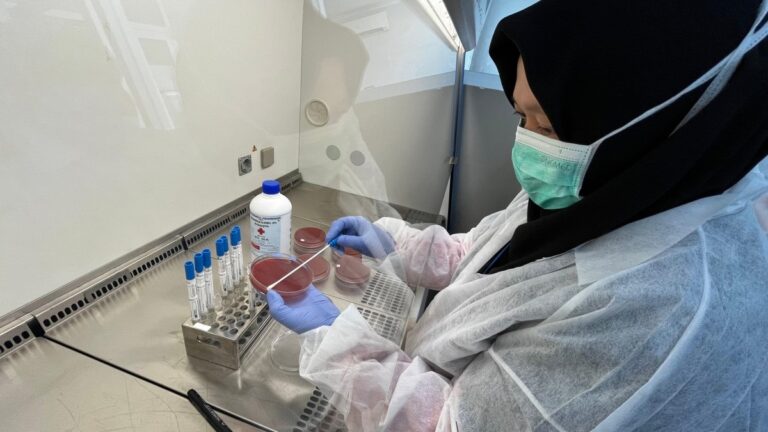After observing their instructors grow Corynebacterium diphtheriae on blood agar, participants also tried the process. Cystine Tellurite Blood Agar (CTBA) is a selective medium used to isolate and grow Corynebacterium diphtheriae (Corynebacterium spp.) bacteria. When grown, suspected Corynebacterium diphtheriae bacteria appear as grey-black colonies. This method is the primary and gold standard diagnostic test for diphtheria infection. Credit: WHO/Bunga Manggiasih
From 23 to 29 June 2024, laboratory technicians from all over Indonesia participated in a hands-on training on how to perform microscopic, bacteriological and toxicological tests for diphtheria, a disease that can kill 30 percent of unvaccinated patients without proper treatment, putting young children at particular risk.
The week-long training was conducted by the National Institute of Hygiene and Biology in Jakarta and involved technicians from various risk and endemic areas, including Ambon, Banda Aceh, Banjarbaru and Papua. Supported by the World Health Organization (WHO) and the Australian Government, it complements national efforts to strengthen diphtheria case management and ensure that every child receives three doses of diphtheria-containing vaccine in early childhood, with a booster dose at 18 months of age and at school.
Since the onset of the COVID-19 pandemic, disruptions to routine immunization services and surveillance activities have increased the frequency and severity of diphtheria cases worldwide. Between 2019 and 2021, the number of unvaccinated (‘zero dose’) children increased by approximately 40% worldwide, with wide variations between and within countries.
In Indonesia, due to gaps in routine immunization coverage, 103 cases of diphtheria were reported in 68 districts and cities in 19 provinces in 2023. A total of 69 deaths were reported nationwide. Diphtheria cases were detected and reported by eight public health laboratories at the provincial and national levels. The two national-level laboratories were the National Institute of Hygiene and Biology in Jakarta and the Regional Public Health Laboratory in Surabaya.
“Early detection of diphtheria cases and contact tracing are essential for more effective and precise treatment and control of diphtheria,” said Dr Enda Kusumowadani, head of the Indonesian Ministry of Health’s Surveillance Laboratory Working Group. “If diphtheria is suspected, testing should be done promptly and treatment should begin as soon as possible, which is why this training is so important, especially for communities in remote and hard-to-reach areas where health services are underserved.”
Symptoms of diphtheria usually begin two to five days after exposure to the bacteria and include sore throat, fever, swollen lymph nodes in the neck and weakness. Diphtheria cases are typically treated with diphtheria antitoxin and antibiotics, which are detailed in WHO treatment guidelines. The guidelines were shared with health workers across the country through a series of webinars and workshops in both 2023 and 2024.
During the laboratory training from 23 to 29 June, participants took part in practical sessions on diphtheria specimen management, biosafety and biosecurity, and testing of specimens by microscopy, culture, PCR and Electest. The training is aligned with the WHO South-East Asia Regional Diphtheria Surveillance Guide published in September 2023 and will inform Indonesia’s future immunization programme and priorities.
“Australia is pleased to partner with Indonesia and the WHO to strengthen testing and surveillance capacity to protect the community and reduce health risks,” said Madeleine Scott, first secretary for health at the Australian Embassy in Jakarta. “This underlines our commitment to strengthening our shared health security and resilience.”
In line with the Joint WHO Country Collaboration Strategy for Indonesia 2024-2027, WHO will continue to provide practical support to the Ministry of Health across all areas of diphtheria prevention, detection and treatment to help achieve the national control objectives and ensure that together we make “better progress”.
This activity was supported by the Australian Government through the Australian Department of Foreign Affairs and Trade.
Author: Joshua Harmani, WHO National Expert for VPD Monitoring in Indonesia


